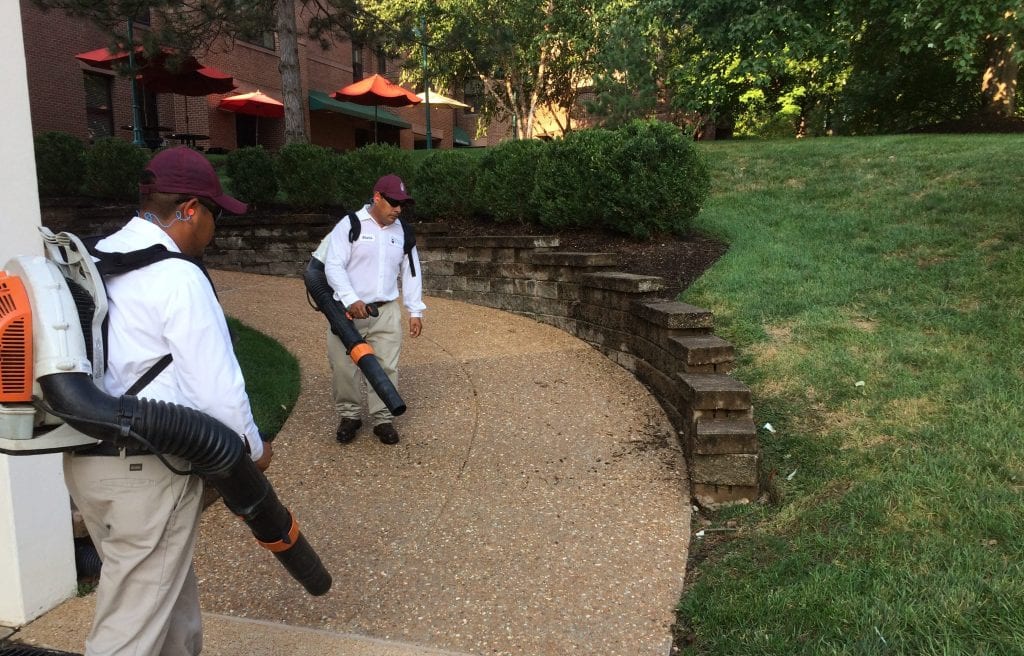As we transition into autumn, leaves will soon begin to fall and scatter throughout lawns and streets. How will you manage your leaves this fall? Selecting the right equipment and strategies can minimize environmental impact.
Lawn Care Equipment Can Emit Toxic Gases
Gas powered leaf blowers and lawn mowers are more detrimental than you would think. Many consumer-grade blowers (and some mowers) use a two-stroke engine, which lacks an independent lubrication system, so fuel has to be mixed with oil. Burning oil and fuel emits a number of harmful toxic pollutants into the air, including carbon monoxide, nitrous oxides (which cause smog formation and acid rain), and hydrocarbons (a carcinogenic gas that also causes smog). Surprisingly, the number of air pollutants emitted by gas-powered leaf blowers and lawn mowers exceed pollutant emissions of large automobiles, which are regulated to reduce and capture many air pollutants. A 2011 study showed that a leaf blower emits nearly 300 times the amount of air pollutants as a pickup truck. Similarly, a 2001 study showed that one hour using a gas-powered lawn mower is equivalent to driving a car 100 miles. Gas-powered leaf blowers and lawn mowers have the potential to cause serious environmental damage, so finding alternatives and utilizing best practices is key (Source: Washington Post).
In addition to air pollution, ozone is created when heat and sunlight react with nitrogen oxides and Volatile Organic Compounds (VOCs) that are emitted from combustion engines, including lawn equipment. St. Louis is among the top-ranked areas for ozone and particle pollution. In fact, according to the Clean Air Partnership, summertime ozone levels have exceeded federal-based health standards every year since the passage of the Clean Air Act. Therefore, small actions, like seeking alternatives to standard use of lawn equipment, can go a long way in improving regional air quality and human health.
What Can Individuals Do?
For one, switching to electric alternatives can drastically reduce the number of toxic pollutants directly released into the air. While electric models do not eliminate your contribution to greenhouse gasses, it shifts combustion to power plants. Power plants are equipped with scrubbers that filter out pollutants, sharply reducing the overall amount of air pollution being released when fossil fuels are burned.
Time of day matters too. According to the St. Louis Clean Air Partnership, if you are using a a gas lawn mower, mow before 10 a.m. or after 7 p.m. to avoid peak ozone formation hours.
For smaller landscapes it may be possible to switch to an emission-free, non motorized push mower. Push mowers are solely operated by the user pushing the lawn mower across the yard, meaning it emits absolutely zero pollutants. Similarly, an old fashion yard raking can be fun (jumping in leaf piles, anyone?) and a good work out. Be sure to compost your leaves over winter or bag the leaves in paper bags for pick up.
Rather than collecting your leaves, you can mow over your fallen leaves, as they provide protective and nutrient-rich mulch for your lawn.
What is WashU doing to minimize the impact of lawn care equipment?
WashU has also recognized the need for a shift away from gas-powered leaf blowers and lawn mowers and has taken major steps to make landscaping and lawn care more environmentally friendly.
All lawn equipment used by WashU meets current EPA regulations. The lawn mowers used throughout campus are all propane-powered to reduce emissions, with very minimal use of gas-powered units (for example, when propane units are being serviced). The line trimmers and blowers used are all 4-stroke equipment, which is significantly better than the 2-stroke engines found in most gas-powered leaf blowers. Four-stroke engines offer more complete combustion and produce less air pollution. In addition, the oil used in the 4-stroke engine is a higher quality synthetic oil which can be mixed at a thinner rate (80:1) and ultimately burns clearer. Equipment is maintained on a regular schedule to keep everything operating at peak condition. Additionally, leaves are mulched over with propane mowers as often as possible to reduce the use of leaf blowers, while adding organic matter back into the soil.
WashU has also begun trialing battery operated equipment this year. Currently, the school owns one push mower, one line trimmer, and one leaf blower. While the 4-stroke engines are currently more effective for larger landscapes of the school, WashU is looking into getting more battery-powered equipment.
While it may seem like an inconsequential action, changing how you think about your lawn care can have big effects on air quality and human health.
Be mindful of how your leaves can make a big difference this fall!
Thank you to the Focal Pointe Outdoor Solutions team for providing updates on WashU’s current landscape practices. Focal Pointe provides the landscape maintenance services on WashU’s campuses.
